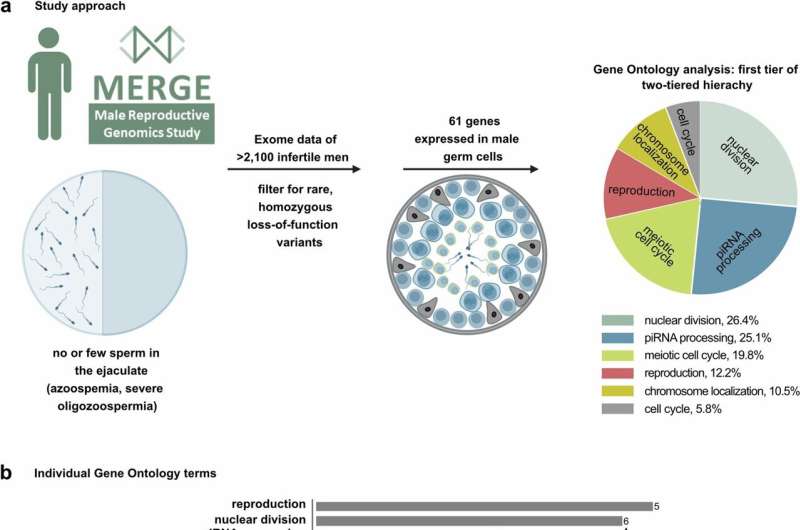This article has been reviewed according to Science X's editorial process and policies. Editors have highlighted the following attributes while ensuring the content's credibility:
fact-checked
peer-reviewed publication
trusted source
proofread
Researchers identify piRNAs as a highly relevant genetic cause of male infertility

Many couples struggle with infertility. Contrary to popular belief, men are just as often the cause of an unfulfilled desire for children as women—and genetics play a significant role in this. Researchers from the Institute of Reproductive Genetics at the University of Münster have now provided new insights on this topic.
The study, published in Nature Communications, shows for the first time that disruptions in the so-called piRNA pathway are an underestimated cause of defective sperm production.
RNA, short for ribonucleic acid, is a single-stranded molecule composed of nucleotides present in every cell of an organism and acts as a carrier of genetic information. PiRNA refers to specialized, very small RNA fragments found in the testes that help suppress the activity of transposons, also known as jumping genes.
"The piRNA pathway has largely been studied in mice, with limited data on humans," says Stallmeyer. To address this, the researchers analyzed the DNA of more than 2,000 infertile men, mostly from the Münster Center for Reproductive Medicine and Andrology, for variations in piRNA pathway genes.
"We identified 39 men with variations in 14 piRNA genes, many of which are reported here for the first time. Our findings reveal that faulty regulation of piRNAs is a far more common cause of male infertility than previously recognized," she explains.
The impact of these genetic variants on sperm production differed between humans and mouse models, suggesting that findings from mice are not universally applicable to humans.
In some patients with piRNA variants, an increased number of transposons was detected. "A higher count of jumping genes in germ cells causes genomic instability, leading to various disruptions in sperm production, from abnormal shapes to complete absence of sperm," says Prof. Frank Tüttelmann, Director of the Institute of Reproductive Genetics and the Center of Medical Genetics and last author of the study.
While the newly discovered disruptions in the piRNA pathway cannot yet be treated, these insights will help provide more men with an accurate diagnosis in the future—offering relief to many who have faced years of uncertainty.
"Further research will help us identify which patients can successfully have sperm retrieved through a testicular biopsy and sperm extraction for medically assisted reproduction. Conversely, we aim to determine who would not benefit from this procedure, allowing for more targeted treatments," says Tüttelmann.
More information: Birgit Stallmeyer et al, Inherited defects of piRNA biogenesis cause transposon de-repression, impaired spermatogenesis, and human male infertility, Nature Communications (2024). DOI: 10.1038/s41467-024-50930-9





















